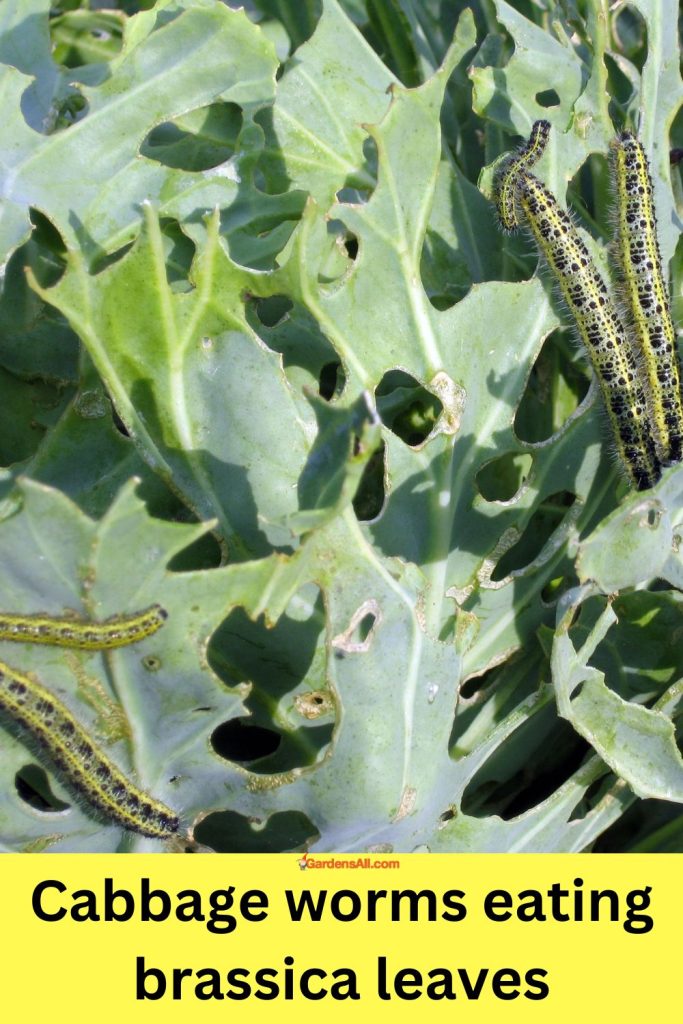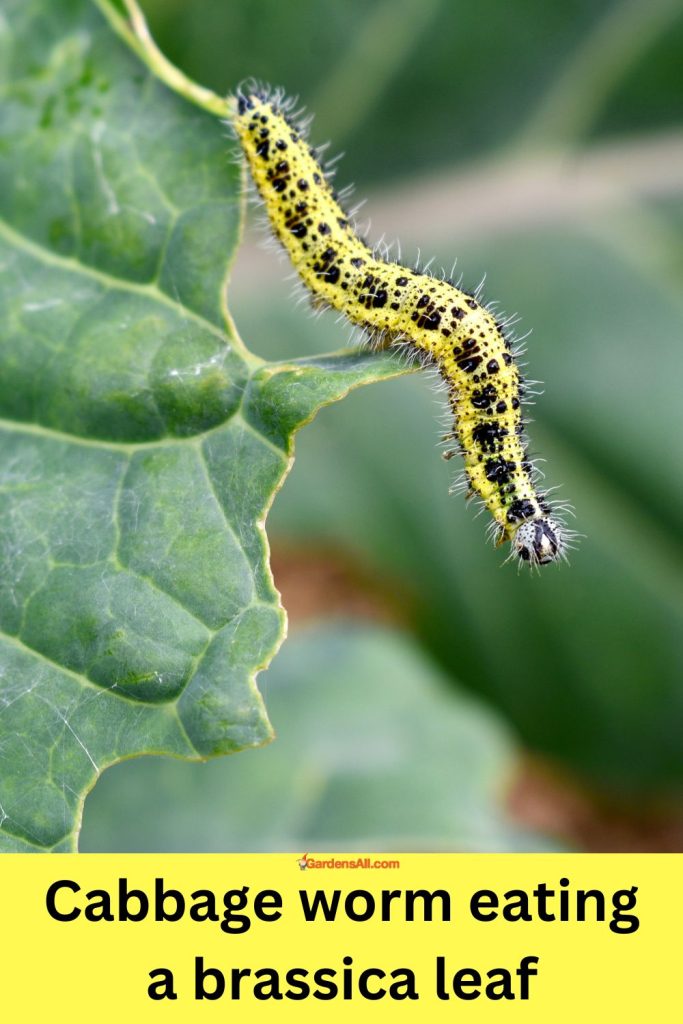Waging War Against Cabbage Worms in the Battle of the Brassicas
Whether you’re looking at prevention or at treatment, here we cover how to get rid of cabbage worms naturally, using organic methods.
The first thing is prevention. See cabbage moth control.
Cabbage worms can decimate an entire crop of brassicas, seemingly overnight. We’ve had it happen and it’s one of those gardening fails that can have you thinking about giving up. Except that you can’t.
At this writing, it’s July and all the garden pests are in full force. We just had a community member post the following comments:
“I give up!!! I’m never going to grow any cruciferous/brassica vegetables again. I used a white mesh to stop those white cabbage butterflies getting to my plants and yet they still managed to do so.. My whole row of cauliflower is full of worms.”

Cabbage Worm Prevention
If you can head this off by preventing the cabbage moth from laying eggs on your brassicas, then you’ll be ahead of the game.
Seee
Learn, Adjust and Keep on Growing!
Take heart. Gardening is rarely a plant and forget endeavor. So while it’s not always easy, and you may lose a few battles (or plants) to cabbage worms, it is possible to win the war against cabbage worms with diligent application of natural methods proven to work.
You know you’ve got to keep on growing, and given time, the pain of the loss will lessen. So next season, armed with information on how to get rid of cabbage worms, you’ll give it another go. And chances are you will succeed!
If Others can Do It, You can too!
Never say never. Many people all over the world manage to grow brassicas organically. Chances are they’re not any smarter than you. They just didn’t give up and kept trying recommended solutions.
So this is when you remind yourself of how much you love working in the soil, being outdoors and growing your own food. Time to straighten your back, reclaim your grit and natural optimism and consider that if at first you don’t succeed, try try again.
How to Get Rid of Cabbage Worms Naturally (Before They Get Rid of Your Crops)!
1. Manual Removal of Cabbage Worms
The method of handpicking cabbage worms off your plants might not be the most pleasant task, but it’s one of the most direct ways to rid your garden of these pests. Although this process can be quite time-consuming, diligent and regular checks for these pests can ensure your leafy greens stay healthy.
A preferred disposal method is to drop the pests into a bottle of soapy water. Later the remnants can be emptied out into a refuse area or capped and thrown into the garbage.
2. Introduction of Beneficial Insects
Inviting natural predators such as ladybugs, spiders, and birds into your garden can help control cabbage worm populations. In particular, parasitic wasps — such as Trichogramma wasps — can be effective against these pests. The wasps lay their eggs inside cabbage worms, which then hatch and kill the host.
The problem with parasitic moths is that they are not discriminating. They can attack the good caterpillars as well, such as those that become butterflies and hummingbird moths, both of which are delightful pollinators to have around.
See also, plants that attract butterflies.
Next, see ways to attract beneficial insects.
3. Plants that Attract Beneficial Insects
Nectar plants with small flowers are the best way to naturally attract beneficial insects. This includes dill, parsley, and wild carrots, AKA Queen Anne’s Lace.
4. Interplanting with Companion Plants
Certain herbs like thyme, sage, rosemary, or peppermint are known to deter cabbage worms. By planting these herbs alongside your cabbage family crops, you have a chance of deterring these pests from making a buffet of your garden.
See also, healthy benefits of rosemary.
5. Lure Plants Best for Attracting the Cabbage Worm
Lure plants, or trap crops, can be used to attract cabbage worms, drawing them away from your main crops. Here are some plants that are particularly attractive to cabbage worms:
- Nasturtiums: These colorful flowering plants are very attractive to cabbage worms. Plant them around the perimeter of your garden to draw pests away from your cabbages.
- Mustard plants: Cabbage worms are highly attracted to mustard plants. You can plant them around your garden as a trap crop.
- Radishes: Like mustard plants, radishes are also highly attractive to cabbage worms and can serve as an effective trap crop.
- Kale: This is another plant that cabbage worms find very tasty. You can plant some extra kale specifically as a lure for the cabbage worms.
If you have lure plants out in the open and other beds of these same crops under frost covers, chances are the cabbage moths will be more likely to lay their eggs on the more easily accessible plants.
Once they’ve been attracted to the lure plants, you can remove and destroy them, along with any cabbage worms that have been drawn to them.
6. Diatomaceous Earth
Diatomaceous earth is a natural substance made from the fossilized remains of tiny aquatic organisms called diatoms. Dusting the leaves of your plants with this substance can help combat cabbage worms. The minute crystalline shapes have sharp edges that puncturing the worm bodies, causing them to dehydrate and die.
See also, organic pest control.
7. Installation of Row Covers
Using floating row covers (AKA frost covers) can provide a physical barrier against cabbage worms. These lightweight fabrics can be placed over your crops, towards preventing adult butterflies from laying eggs on the leaves.
These covers allow sunlight and water through, but help to keep out the pests. However, diligence is still required as these moths can easily slip in through gaps and minute openings in the covers, or the moment you lift them to check plants.
So keep an eye out and be ready to remove them with any sighting.
8. Application of Neem Oil
Derived from the neem tree, neem oil is a potent natural pesticide that can be used against cabbage worms. By spraying this oil on the leaves of affected plants, you can target these pests directly.
While neem is a natural extract, it is potent and harmful to bees, so be careful to spray on plants without blossoms. Alternately, you can spray it in the evening after the bees have turned in for the night.
9. Use of Bacillus thuringiensis (Bt)
Bacillus thuringiensis (Bt), is a naturally occurring bacterium that can be deadly to many types of caterpillars, including cabbage worms. You can find Bt in most garden stores and it can be sprayed directly onto the leaves of plants to protect them against these pests.
10. Homemade Cabbage Worm Sprays
Garlic or hot pepper sprays made at home can help deter cabbage worms. You can make these sprays by combining water with crushed garlic or hot peppers and a little soap. Spray this mixture onto your plants to repel cabbage worms.
Daily Scans Can Save Your Crops!
In all these, it’s crucial to remember that early detection and regular checks are key to controlling cabbage worms. While a small population of cabbage worms can contribute to a balanced garden ecosystem, larger infestations can damage your crops.
If you see an infestation, don’t give up. Just get busy getting rid of them. You can do it!
We’d love to hear what works best for you.

I’m LeAura Alderson, a garden, herb and plant enthusiast with a passion for discovering the many edible and medicinal benefits of the plants all around us, including the weeds! I’m a writer, editor and media publisher for our family of websites.
While I was certified in fitness and life coaching, I am NOT a health practitioner. However, I’m a lifelong health enthusiast, with a keen interest in healthy, organic foods and making home remedies and the content we share is from our own experience and usage as well as that extracted from scientific research so that you can explore further on your own.
Always seek the advice and guidance of your health practitioners first and foremost.
As a family we’re steadily expanding our gardening, experimentation and knowledge around all things gardening, edible landscaping, fresh organic foods and self sustainability with farming in our future. I also own and manage iCreateDaily.com, a site all about transformation through creation, and the power of positivity, optimism and mindset.

